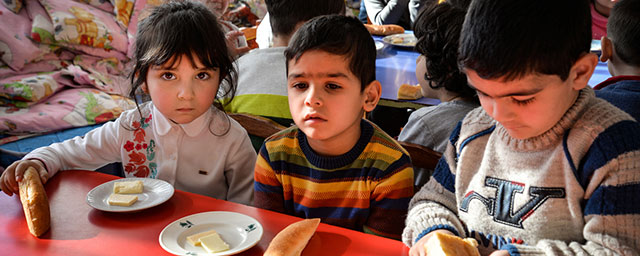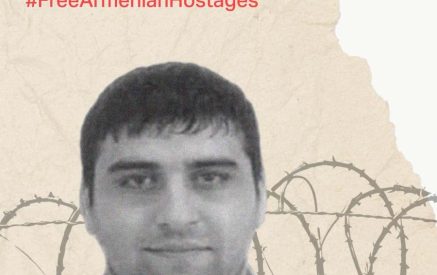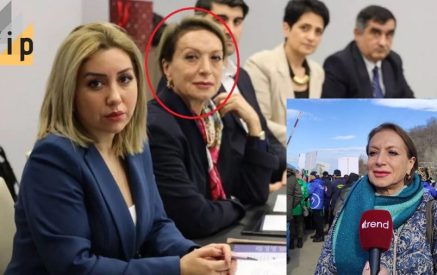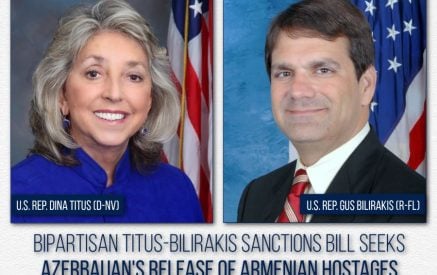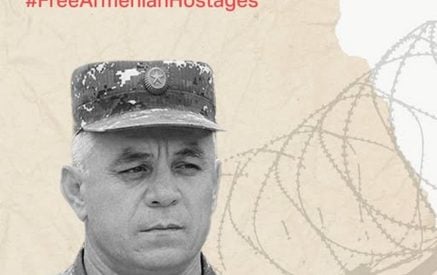December 22, 2022 – Members of the Aurora Humanitarian Initiative and leaders of the global humanitarian community have issued a statement regarding the current situation in Nagorno-Karabakh (Artsakh) that threatens to result in a full-scale humanitarian crisis in the region. Internationally known human rights defenders and peace activists are extremely concerned with the world’s indifference and call for immediate action:
“On December 12, 2022, the Azerbaijani forces blocked the Lachin corridor, the only mountain road that links Armenia and the enclave of Artsakh. Before the blockade, the corridor was used for the delivery of vital supplies, including food and medication. The blockade is creating a humanitarian catastrophe.
On December 13, emboldened by the world’s indifference, Azerbaijan has cut off the gas supply as well, putting the local population in immediate danger of freezing to death.
The events unfolding now in Artsakh remind us of the tragedy of Srebrenica in 1995. Thousands of people died when the lack of a timely reaction to similar provocations and the general inaction of international peacekeepers resulted in the mass murder of civilians in what later became known as the Srebrenica genocide. This must not happen in Artsakh, especially when there are known means to prevent it.
Read also
The movements of Azerbaijani forces betray an attempted ethnic cleansing, a genocide on the European continent, and should be treated as such, with no allowance for clemency. Lack of swift and unified reaction on the part of the international community will only convince Azerbaijani government that they can continue with absolute impunity, facing no consequences for their actions.
History knows several examples of what such dangerous unrestraint might bring, some of them still fresh and painful in our memory, like the tragic fate of the Tutsi ethnic group during the 1994 genocide in Rwanda.
An international humanitarian airlift should be organized in Artsakh immediately, delivering food and other essentials to the local population and evacuating those whose life is endangered to safety. Among these are several patients of the Republican Medical Centre Stepanakert in grave condition requiring urgent medical care that cannot be adequately provided because of the blockade.
The illegal blockade of Artsakh must be broken by all means necessary. The connection of Artsakh to Armenia and the rest of the world must be restored. Armenians have lived on these lands for thousands of years and should not be subjected ethnic cleansing.
In the meantime, while the road remains blocked, the humanitarian airlift should help the local population to survive and sustain. There already is an operational airport in Stepanakert, which can be used for this purpose. This will not require any additional efforts on the side of the international community except for those necessary to maintain the airlift and ensure its safety.
Again, this has been successfully done before. In 1948, a crisis erupted in Berlin, divided and controlled by the Allied forces and the Soviet troops. As Stalin tried to cut of the city and starve it of food, water, and electricity, the only remaining link were the air corridors used by the US forces to ferry supplies to the isolated sectors.
Helping the people of Artsakh by organizing the airlift falls squarely in the legal doctrine of Responsibility to Protect (R2P) stipulating that international community has the responsibility to intervene and take appropriate collective action if the population of an individual state is facing the threat of genocide, war crimes, ethnic cleansing, and crimes against humanity. This global political and legal commitment was designed specifically to prevent and diffuse situations like this and must be invoked in this case.
We draw parallels between the Berlin crisis of 1948 and today’s situation because after the World War II, political leaders have taken to saying the phrase ‘Never again.” Albeit a nice sentiment much to the credit of those repeating it, it will remain just that – a sentiment – unless there are some tangible actions to back it up. Artsakh is the world’s chance to prevent a modern genocide, and the consequences of failing to achieve that would be too heinous to even consider this option.
The events of December 2022 in Artsakh have revealed, with stunning clarity, the actual intentions of Aliyev’s government regarding the Armenian residents of Artsakh. Having tried and failed to drive them out of their land by force – or, in his own words, “to chase the residents of Artsakh like dogs,” –President Aliyev is now more than willing to subject them to the torture of slowly freezing to death and starving. He cannot be allowed to do that, nor can he be trusted with any legal rights to rule over them since he has demonstrated a blatant lack of concern.
The case of Hitler, together with several more recent examples, should have taught us that appeasing dictators does not work. They only understand the language of accountability. The sooner the intervention happens, the less force is required to derail their plans and put humanity back on track. Pleading with a dictator or patiently waiting for him to change his mind does nothing but encourage him and prolong the suffering of those he persecutes. President Aliyev must be stopped, and it is the world’s responsibility to make that happen–with utmost urgency.”
Signed by:
Fartuun Adan
2020 Aurora Prize Laureate; Executive Director, Elman Peace and Human Rights Centre
Noubar Afeyan
Co-Founder, Aurora Humanitarian Initiative; Founder and CEO, Flagship Pioneering; Co-Founder and Chairman, Moderna
Jamila Afghani
2022 Aurora Prize Laureate; President, Women’s International League for Peace and Freedom Afghanistan
Marguerite Barankitse
2016 Aurora Prize Laureate; Founder, Maison Shalom International
Tom Catena
Chair, Aurora Global Movement; 2017 Aurora Prize Laureate; Medical Director, Mother of Mercy Hospital
Lord Ara Darzi
Chair, Aurora Prize Selection Committee; Co-Director, Institute of Global Health Innovation at Imperial College London
Mirza Dinnayi
2019 Aurora Prize Laureate; Co-Founder, Air Bridge Iraq
Shirin Ebadi
Member, Aurora Prize Selection Committee; Founder, Defenders of Human Rights Center; 2003 Nobel Peace Prize Laureate
Ilwad Elman
2020 Aurora Prize Laureate; Program Director, Elman Peace and Human Rights Centre
Leymah Gbowee
Member, Aurora Prize Selection Committee; Founder and President, Gbowee Peace Foundation Africa; 2011 Nobel Peace Prize Laureate
Bernard Kouchner
Member, Aurora Prize Selection Committee; Co-Founder, Médecins Sans Frontières; former French Foreign Minister and former Minister of Health
Julienne Lusenge
2021 Aurora Prize Laureate; Co-Founder, Fund for Congolese Women
Dele Olojede
Member, Aurora Prize Selection Committee; Writer, Editor and Publisher; Pulitzer Prize Winner
Paul Polman
Member, Aurora Prize Selection Committee; Business Leader, Climate and Equalities Campaigner; former CEO of Unilever
Mary Robinson
Member, Aurora Prize Selection Committee; former President of Ireland
Ernesto Zedillo
Member, Aurora Prize Selection Committee; Director, Center for the Study of Globalization at Yale University; former President of Mexico
* * *
About the Aurora Humanitarian Initiative
The Aurora Humanitarian Initiative is a foundation that seeks to address on-the-ground humanitarian challenges around the world with the focus on helping the most destitute.
All Aurora’s activities are based on the universal concept of Gratitude in Action. It implies that countless people around the world who have received aid in time of crisis can best express their gratitude by offering similar assistance to someone else. By involving Aurora supporters around the world, this will become a global endeavor that will snowball to expand the circle of saviors and most importantly – the number of those saved.
Addressing urgent humanitarian challenges, the Initiative provides a second chance to those who need it the most. True to its vision – “We believe that even in the darkest times, a brighter future is in the hands of those who are committed to giving others help and hope” – Aurora welcomes all who embrace this philosophy.




















































